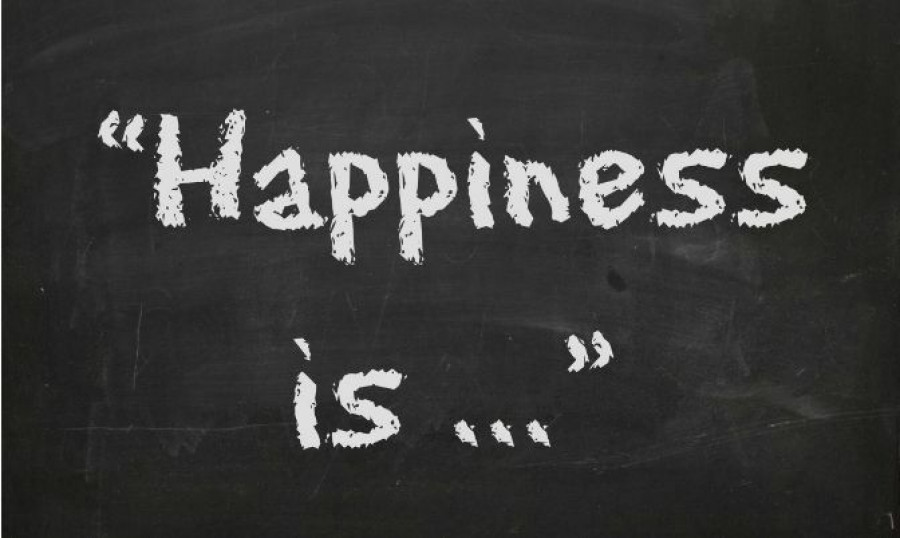Is happiness synonymous with material success, then why can’t the wealthy find happiness? For many, happiness is merely a series of events: engagement, marriage, birthday, graduation, a new job, the purchase of a new automobile or home. What is happiness?
Happiness is both personal and interpersonal. It is a state of contentment with one’s personal life and general state of interpersonal affairs. For instance, graduating from university brings happiness, not just for the graduate, but also to proud parents, siblings, family members and friends, and even for teachers and professors. A new born brings happiness to the proud parents, grandparents, and family members.
Each individual faces a unique set of circumstances in his or her life that contributes to his or her happiness or unhappiness, and each one can attest to common circumstances in life that cause happiness or unhappiness, though temporary, such as: an automobile accident, the loss of one’s investment in the stock market, or the loss of employment. The religious individual may seek an answer from God for their loss and the resultant suffering, thus maintaining a tranquil state.
It seems as though, we are either happy or unhappy due to three converging states of mind: (1) unresolved issues from the past; (2) present circumstances, and (3) fears and anxieties for the future. We voluntarily or involuntarily yield to these three converging states of mind, and we often allow past, present, and future circumstances to permeate our conscious and subconscious minds. In the process, we inhibit our creative energies, our happiness, our relationships, and our joy.
Childhood experiences, material status, social standing, family conflicts, internal prejudices, and even financial and material standing can affect one’s happiness. Careful observation demonstrates the pervasive effects of unhappiness, as it affects individuals of all races, cultures, religions, and socioeconomic classes. These observations lead to the conclusion that some level of happiness and unhappiness is an acceptable norm in society, and most of us can manage the undulating nature of our happy or unhappy state; but for some individuals, happiness is a material compulsion, and it can lead to chronic unhappiness, to mental anguish, and depression.
We can bring about a “revolution of happiness” when we embrace the need for a spiritual, moral, social, intellectual, and physical revolution in the way in which we think and lead our lives, and in the process how we serve others. Further observation shows that in our twenty–first century, happiness has become a pursuit, as opposed to a way of life for many. This is demonstrated by many published works on happiness, happiness projects, and even a movie: “The Pursuit of Happiness”. Is the pursuit of a better material life congruent with happiness?
The prevailing conditions of unhappiness have formed the backbone of our advanced societies with overproduction, too many options (choices), and overindulgence in things that are supposed to make us happy. Travel around the globe and observe those who live in the developing and underdeveloped world. Some are poor, hungry and full of misery, but despite their disenfranchised condition, happiness radiates from their burdened souls. Why can’t material abundance radiate happiness in the Western world? Despite advancements in the modern world, happiness is merely a temporary state in the lives of many, fostered by unparalleled individualism.
The Search for happiness:
The search for happiness is not a material search. No amount of money or material possessions can guarantee happiness. No husband or wife can guarantee happiness. No winning of a competition can guarantee happiness. No exotic automobile or executive home can guarantee happiness. No lottery winning or acquiring of a doctorial degree can guarantee happiness. There is no doubt that a measure of temporary happiness is engendered when goals and objectives are achieved. Happiness is not strictly a material imperative; there is something that is innate within the human spirit that cries out for something deeper, something more lasting, and something more profound than the material to bring us to a more sustained state of happiness.
We begin our search in earnest when we recognize the human family as one indivisible whole with a common need for universal love, hope, joy, peace, patience, compassion, forgiveness, gentleness, kindness and happiness. These conditions foster better relations with others and promote self–esteem. The elevation of one’s self–esteem flows over into the lives of others and helps to mitigate behaviors that are self–destructive. Inner joy and outer happiness then reign supreme in the life of self and of others.
We can achieve a perpetual state of happiness when we seek to do daily acts of kindness, to embrace every opportunity to exercise care in our relationships, and to free ourselves from anger and from situations that anger our spirit. We can begin with an attitude of forgiveness. A positive attitude bolsters our happiness; therefore, we should strive to be positive and to promote the same in others. It may require moral courage, but be courageous, and be happy.
A major step in this search is the recognition that there are past, present, and future circumstances that are beyond our control, such as, the country of our birth, the family we were born into, and our race and culture. There are also circumstances that we can control, beginning immediately with an attitude of forgiveness, our attitude toward family, in–laws and strangers, our attitude toward those less fortunate than ourselves, and attitude toward self.
While we can strive to improve our educational standing, our conduct in private and public affairs, and our health and physical wellbeing, we must first examine our motives to ensure that our actions are primarily motivated by a desire to be better human beings and not allow ourselves to become victims of circumstances that dictate who we are. For instance, many may be perplexed by the way in which society perceives them due to race, color, educational, or socioeconomic status. All that one can do is strive to rise above such circumstances spiritually, morally, socially, and intellectually.
Our search for happiness will engender a “revolution in happiness” when we embrace the need for a spiritual, moral, social, intellectual, and physical revolution in the way in which we think and live. If we see life and happiness as merely a series of events to which we look forward with great anticipation, we may often find disappointment after the event has passed. Happiness then becomes an illusion. Conversely, if we see life as a journey and a process of learning to manage expectations and outcomes, we may discover a journey that is more fruitful than the destination. For this reason, the pursuit of joy, which transcends happiness, ought to be the true search, because happiness is encompassed in joy. Joy is the higher state of happiness that we should strive to achieve. It is a spiritual compulsion (permanent), as opposed to a material compulsion (temporary).
— Happiness is a state of mind, and not merely a state of being or having.
Unless otherwise expressed, the views expressed in the opinion column are not endorsed by the editors or publishers of ByBlacks.com









